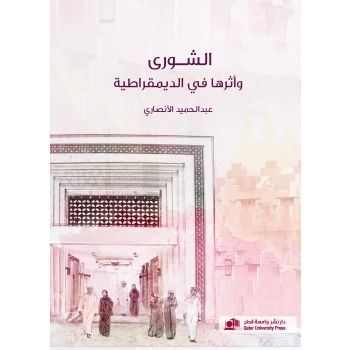الشورى وأثرها في الديمقراطية
كلمة متقادمة عن الكتاب: هناك كتب تضيء العقل، وتحمل نسائم الوعي والحرية، فتُسهم في بناء مجتمعها بصورة فعالة. قرأت منها كتابًا بعنوان: الشورى وأثرها في الديمقراطية؛ دراسة معمقة مقارنة، للأستاذ الدكتور عبد الحميد إسماعيل الأنصاري، الأستاذ الفخري والعميد الأسبق لكلية الشريعة والدراسات الإسلامية في جامعة قطر. يعرض الكتاب أهمية الديمقراطية وضرورتها؛ وأنها من أنجع الطرق لتقدم الأمم ونهضتها، وقد جلّى المؤلف نصَّ القرآن الكريم على الشورى كقاعدة ملزمة وواجبة، وكمبدأ عام، تاركًا تفاصيله للأمة، تكيِّفه ظروفها المتغيرة، فكان ذلك إيذانًا بضرورة الاستفادة من التجارب المتنوعة للأمم. ما دامت صالحة، ولا تخالف الأسس العامة المقررة في الإسلام. وقد عرفت البشرية أنظمة مختلفة للحكم خلال تاريخها الطويل، انتهت إلى أن أفضل صيغة لها هي الديمقراطية، وذلك يعني في الجوهر حكم المجتمعات نفسَها بنفسِها. فأصبحت الديمقراطية أساس النظم الحديثة للدول التي تأخذ بها، ومصدر نهوضها وتقدمها. وأمام هذه الأهمية المتزايدة لها ولضرورتها الملحة، ظهرت تساؤلات كثيرة عن موقف الإسلام منها، وبخاصة؛ عن علاقة الشورى بها. من هنا جاء هذا الكتاب مستكشفًا جوانب الاتفاق والاختلاف بين الشورى والديمقراطية، باحثًا عن كيفية مساهمة الشورى في علاج أوجه النقد في الديمقراطية. ومبيّنًا مدى إمكانية الاستفادة من أساليب الديمقراطية الحديثة؛ كل ذلك بهدف التوصل إلى وضع أسس عامة يمكن الاستفادة منها في إقامة نظامٍ سياسيٍّ إسلاميٍّ؛ يجمع بين المضمون الأصيل والشكل المعاصر، وهذا هو الجديد في البحث، وهو ما نغفله غالبًا حين نتكلم عن الإسلام العظيم بأسلوب الماضي. أحمد بهجت ]بتصرف[An early commentary on this revised edition: Some books enlighten, open and free the mind, thus effectively contributing to building the society. A book I read is titled “Shura and its Impact on Democracy”. It is such an insightful comparative study. The author, Dr. Abdul Hameed Ismail Al-Ansari, [Emeritus Professor & former Dean of College of Sharia and Islamic Studies at Qatar University] tells us about the importance and necessity of democracy, summed up in the fact that it is the only way for nations to progress and rise. The Holy Qur’an, the author explains, has stipulated the principle of shura as an obligatory and enforceable rule; however, the Qur’an merely stipulated the general principle and left its details to be adapted according to the nation’s varying and changing circumstances. This defines the possibility for the Islamic nation to benefit from other nations and their experiences if they are valid, and do not violate the general principles established in Islam. Humanity has known different administrative and government systems throughout history, and it has concluded that the best form of government is democracy, which essentially means rule of the people. Democracy has become the basis of modern systems that countries adopt for their advancement and progress. In the face of this growing importance and urgency of democracy, many questions arose about Islam’s position on democracy, especially about the relationship between shura and democracy, which this book discusses in detail. So, the thesis of the book explores areas of agreement between shura and democracy, and the difference between them, and focuses on how shura contributes to treating the criticism of democracy. It also highlights the possibility of benefiting from modern democratic methods; all with the aim of laying down general foundations that can be used to establish an Islamic political system which combines tradition and modernity. The content is unique: it endeavors to mix the original with the contemporary, something often overlooked when we talk about Islam in past tense. Ahmed Bahjat [emphasis added]
QAR 0.00
SKU
QUPR9468

